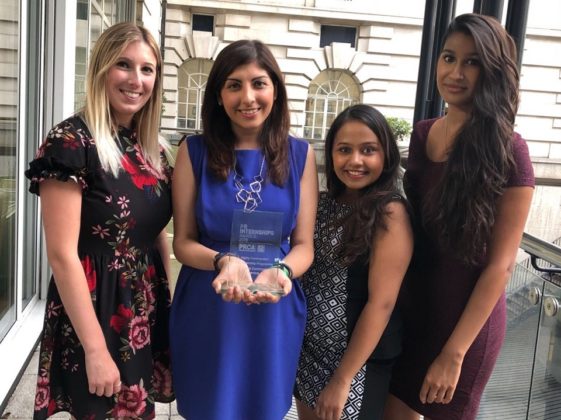Internship application guidance
We are committed to ensuring GCS is a destination of choice for communications professionals. As part of the GCS strategy commitments we are currently reviewing all our talent programmes to enable us to develop a talent attraction strategy that highlights the unique opportunities available in GCS.
Information you need to apply for the Government Communication Service (GCS) Internship programme.
On this page:

When I heard about the GCS Diversity and Inclusion internship scheme and how it encouraged diverse candidates to apply, I started the application process straight away.
Background
The Government Communication Service Diversity and Inclusion strategy commits to recruit, promote, develop a diverse and inclusive profession. As part of the GCS commitment to diversity and inclusion, the GCS Internship initiative supports the profession to better represent the communities we serve.
The GCS Internship is a key initiative in the GCS Diversity and Inclusion strategy.
In 2015/16 the GCS launched the communications specific diversity internship with 13 interns.The internship is now in its sixth year onboarding over 45 interns to placements across the Civil Service
Programme successes

The GCS Intership programme has won awards:
- the GCS Internship was awarded the ‘Best Internship Programme’ at the PRCA Internship and Apprenticeship Awards 2019, read the news story
- a GCS Intern won ‘Best Intern’ award at the PRCA Internship Awards 2018
- 2 GCS Interns were shortlisted for ‘Best Intern’ award at the PRCA Internship and Apprenticeship Awards 2019
Tips on applying
Here are some information and tips from a past intern to let you know what to expect when applying for the GCS Internship.
The GCS Internship is a great opportunity to develop your skills and prepare for a career in the communications profession. The internship is a gateway for students from diverse backgrounds into the Civil Service.
Applying for the GCS internship is a straightforward process, but to be successful you need to put a lot of thought into your application.
Before applying
Before applying, read the job advertisement and pay particular attention to the Recruitment process and assessment criteria.
When applying to this internship, it is helpful to look at what is considered ‘effective behaviour’ for staff at Level 1 and Level 2. Refer to:
The framework describes what demonstrating the competencies looks like in practice and can give you an idea of how to show you are competent in these areas. Be careful, however, that none of your answers sound like a rewording of the competency descriptions: there’s no buzzword checklist you need to complete. Instead, focus on a specific example for each question that links naturally to the competency that is being assessed.
When applying
You will be asked to submit a statement of suitability that includes examples of your skills and experience relating to the person specification. Once you’ve decided on an example, use the STAR method (Situation, Task, Action and Result) to structure your answer.
Focusing on the Situation, Task, Action and Result of your experience gives you the best chance of providing the person reading your application with all the information they need. Make sure you identify what you personally contributed and learnt rather than talking in general terms about a project.
A good way to ensure you do this is to use the word ‘I’ instead of ‘we’ throughout your answers.
Don’t be afraid of using examples from contexts that might not initially come to mind as relevant to working in communications or the Civil Service.
You can answer competency-based questions using examples such as waitressing, tutoring and volunteering to help run employability workshops in prisons. As a diversity internship, this scheme is looking for people from different backgrounds and with diverse life experiences. If you’ve done something interesting or exciting that helped you develop a particular skill, it’s relevant.
If this is one of the first times you’ve answered competency-based questions, consider asking a careers adviser at your university to read over them (and take your CV too). Doing this will give you more confidence in your answers and discussing your experiences out loud turned out to be very beneficial going into the telephone interview.
Interview
When preparing for your interview, think again about the competencies and your motivation for applying.
Although it is the job of the internship team to match you with a government department, you should be able to articulate what it is about the Civil Service, and specifically the Government Communication Service, that appeals to you and this might include where your dream placement would be. Also, think about why you want a career in communications and why you chose the GCS as the place to start.
Have a good look around the GCS website to see what current communication topics and disciplines within communications sound interesting to you. Take advantage of the fact that the interview is over the phone by having some key points written down in front of you that you hope to communicate to the interviewer.
Receiving an offer
At this point, you’ve done all you can. If you pass the telephone interview you will receive an email with a job offer detailing which department you’ve been paired with. Your line manager will then contact you about organising your start date and obtaining security clearance. Make sure to be on top of your emails so this process is as quick as possible. Good luck!
What happens after the internship
In 2020, 39% of graduate interns surveyed secured roles following their placements in the GCS. The remaining cohort have returned to university and are acting as ambassadors for the scheme.
Following your internship, you can apply to:
- GCS Assistant Information Officer (AIO) and Information Officer (IO) recruitment campaigns
- entry level communications roles across government
Life as an Intern during the pandemic
Depending on COVID-19 restrictions remote working will be supported and reviewed alongside government guidance. There may be opportunities to work in the office which you should discuss with your placement manager.

Beauty joined the Internship programme in 2020 during the pandemic and reflects on her experience as well as the importance of communications. Read Beauty’s story.
